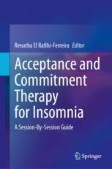Search
Search Results
-
Evaluation and Retrospective Measurements
Assessment is crucial for the effective treatment of insomnia and should be conducted at various stages throughout the treatment process. This...
-
Insomnia: Its Comorbidities and Differential Diagnosis
Insomnia is a common medical problem highly comorbid with medical and psychiatric conditions. It may represent a risk factor, and a bad predictor for...
-
Effects of Sleep Deprivation
This chapter aims to inform the professional about the effects of sleep deprivation on the individual’s health, quality of life, and performance. In...
-
Insomnia
Insomnia is the most common sleep complaint in the general population. The condition can manifest itself in several ways and can be triggered in...
-
Introduction
This chapter introduces the reader to the topic of “ACT for Insomnia” by first highlighting the importance of treating insomnia and then addressing...
-
Evidence of Acceptance and Commitment Therapy-Based Therapies for Insomnia
There is evidence that Acceptance and Commitment Therapy (ACT) can be applied to a range of disorders, including insomnia. This chapter presents the...
-
Impulsivity and Compulsivity in Bayesian Reinforcement Learning Models of Addiction: A Computational Critique of the Habit Theory
Addiction is sometimes argued to represent an extreme dominance of habitual behaviour, driven by stimulus–response associations, over goal-directed...
-

-
Navigation Through the Complex World: The Neurophysiology of Decision-Making Processes
Current theories suggest that adaptive decision-making necessitates the interaction between multiple decision-making systems. The computational...
-
Course and Prognosis of Anorexia Nervosa
Anorexia nervosa (AN) has not lost any of its fascination since the early case studies by Richard Morton and the subsequent detailed initial...
-
Psychodynamic Model Concepts
Psychodynamic psychotherapy has its roots in psychoanalysis, which can be described in a clinical context as a personality, illness, and treatment...
-
Sociocultural Aspects of Eating Disorders
The occurrence of eating disorders varies significantly between different sociocultural groups and over time in a changing cultural environment....
-
Hunger and Satiety
Hunger and satiety are complex psychophysiological states that are controlled by physiological, biological, and social factors. The biological...
-
Eating Disorders and Competitive Sports
Given the huge importance of physical activity for health, all people should regularly engage in physical activity. However, sometimes, athletic...
-
Imaging Techniques in Eating Disorders
There is currently clear, and in many areas sufficiently replicated, evidence of disturbed brain function in eating disorders. It is important to...
-
Peripheral Peptide Hormones, Neuropeptides, and Neurotransmitters
Based on current knowledge, it can be assumed that most of the changes in appetite-regulating peripheral peptide hormones, neuropeptides, and...
-
Neuropsychological Findings in Eating Disorders
Neuropsychological studies attempt to clarify whether cognitive deficits are present in patients with eating disorders, whether these are a...
-
Interpersonal Psychotherapy
Interpersonal psychotherapy (IPT) was developed in 1984 by Klerman, Weissman, and colleagues for the outpatient short-term therapy of unipolar...
-
Medical Complications in Anorexia Nervosa and Bulimia Nervosa
Medical complications of the two eating disorders anorexia nervosa (AN) and bulimia nervosa (BN) result from weight regulation measures such as...
-
Eating Disorders and Diabetes Mellitus
Adolescents and young women with type 1 diabetes mellitus show a coincidental overrepresentation of disturbed eating behavior and eating disorders,...
